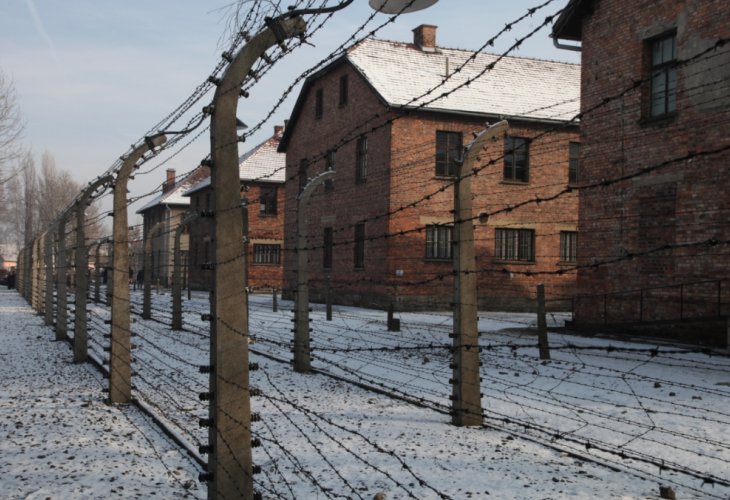Personal Stories
A Shabbat to Remember: Light in the Holocaust’s Darkness
How the Sanzer Rebbe upheld Shabbat and mitzvot with deep joy even amidst the horrors of the Holocaust
 (Illustration photo: Flash 90)
(Illustration photo: Flash 90)Amazing stories were told about the Sanzer Rebbe during the darkest days of the Holocaust. Even in the death camps, he carefully kept every detail of every mitzvah (Torah commandment) that came his way. He didn’t give up not even on the daily mitzvot that demanded literal self-sacrifice.
In the book Torch of Fire, one of the Rebbe’s close companions recounts a powerful story that he personally witnessed. In the final days of the war, when the Germans knew they were losing, the Dachau death camp had already stopped operating its gas chambers and crematorium. But the Nazis still looked for ways to show cruelty.
They took the remaining Jewish prisoners on a harsh death march. The survivors were moved from place to place without food, rest, or any clear destination. It was designed to exhaust and torment them. At times, they were crammed into train cars and transported short distances, only to be shuffled again.
On Friday, the eve of Shabbat Parshat Emor, something strange happened. The train stopped in a village. The prisoners sat locked in the train cars on the tracks. Suddenly, SS officers burst in, tore off their badges, and shouted: “You are free!”
The Jewish prisoners were shocked. Many believed the announcement and quickly jumped off the train to look for food or shelter. But the Sanzer Rebbe remained still. Turning to those around him, he said, “Isn’t it Erev Shabbat (Friday before Shabbat) today? Where would we even go?” Then he added quietly, “My heart tells me this is not what it seems.”
He urged those near him to stay inside the train car for the sake of Shabbat. Only some listened.
Not long after, the Rebbe’s warning became a terrifying reality. SS soldiers suddenly arrived on motorcycles, firing rifles in every direction. Those who had wandered out were gunned down mercilessly. Hundreds were killed.
At the same time, American planes flying overhead began bombing the area, unaware of who was below. Tragically, many more innocent Jews lost their lives.
Only the Rebbe and those who had stayed with him in the train car out of respect for Shabbat remained alive and unharmed.
As silence fell and night arrived, Shabbat began. The survivors were in shock. No one could think clearly. But the Rebbe remained focused. One worry filled his heart: how could he fulfill the mitzvah of having a Shabbat meal?
That was his world in that moment. He whispered, “I’ve never missed a Shabbat meal,” his voice filled with longing. He began moving from person to person, asking gently, “Who wants a portion in the World to Come? Who can give me something to eat in honor of Shabbat?”
He came upon R’ Yaakov Kahn from Selish, who had hidden a few raw potatoes under his shirt. R’ Yaakov gave the Rebbe one potato.
The Rebbe lit up with joy. He began to sing with deep devotion: “Atkinu se’udata dimehemnuta, atkinu se’udata d’malka…”words from the Kabbalistic Shabbat meal prayers. With just that one potato, he fulfilled the mitzvah of the Shabbat meal, with joy and full-hearted gratitude, as if seated at a table filled with delicious foods.
Later, he softly asked R’ Yaakov, “Would you be willing to give another potato for se’udata d’atika kadisha?” the next Shabbat meal. R’ Yaakov agreed. The Rebbe once again rejoiced like the happiest person on earth.
He looked at R’ Yaakov and said with emotion, “I’m not saying thank you now, and I’m not trying to repay you. I want the Master of All Rewards, Hashem Himself, to send you your reward. You cannot imagine the kindness you did for me this Shabbat. Without you, I wouldn’t have been able to fulfill the mitzvah of the Shabbat meal…”
Another story was told by the Rebbe’s father-in-law, Rabbi Unsdorfer, who heard it from the Rebbe himself.
“For nine months in the Mühldorf Inside camp,” said the Rebbe, “I constantly saw a stream of flowing water beyond the electrified fence. It was too dangerous to go near it. But every day, I davened (prayed) to Hashem: ‘Beloved Father, please let me immerse just one more time in a spring of living waters. Please let me once again bless Shehakol nihyeh bidvaro over those waters.’”
When liberation finally came, the Rebbe’s first act was to run straight to that stream in the forest. He jumped into its waters to immerse himself and drank deeply after making the blessing Shehakol nihyeh bidvaro (“Everything came to be by His word”) with tears of emotion.
“If only,” he later said, “I could merit once more to bless Shehakol nihyeh bidvaro like that.”
This is what true closeness to Hashem looks like, to hold fast to Torah, to mitzvot, and to heartfelt blessings even in the hardest of times.
Courtesy of the 'Dirshu' website.

